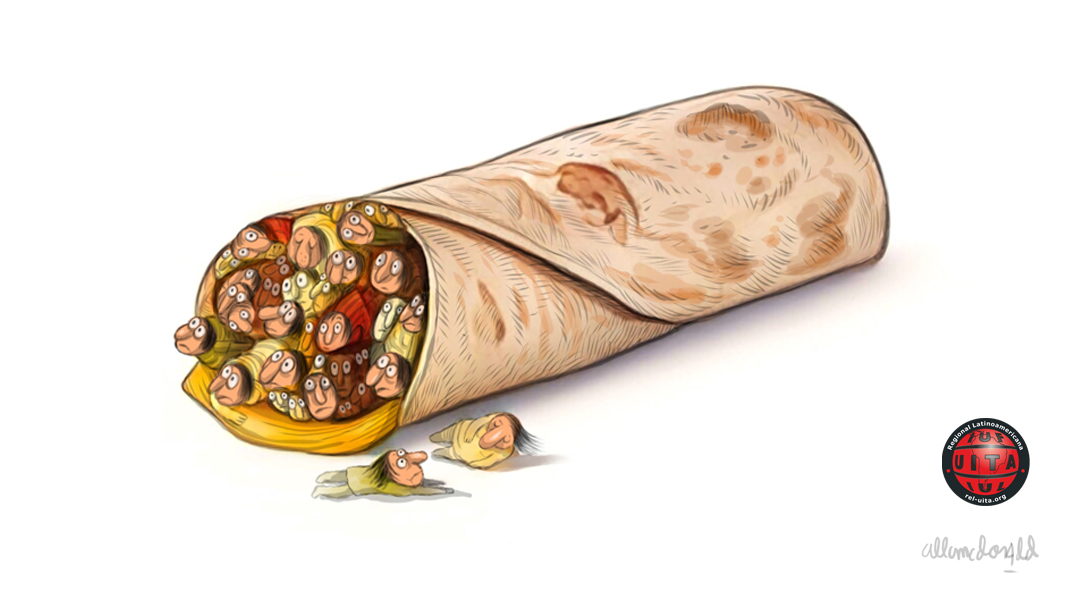United States | HEALTH | RIGHTS
Tough love at Amy’s Kitchen
«I have seen so many people getting hurt, so many people suffering”
Gerardo Iglesias
04 | 03 | 2022

Illustration: Allan McDonald | Rel UITA
When people migrate, they take their cooking with them, and wherever they settle, so does their cuisine. Food is a mark of identity. It is a major part of who we are, distinguishing us geographically and culturally, connecting people with their roots, through knowledge passed on from generation to generation. Food brings migrants closer to the land they left behind. And this is especially true if that land is Mexico.
The Mexican diaspora carries its traditional culinary art wherever it goes, a cuisine born of an intense fusion and which today is immensely popular throughout the world, particularly in the United States. Tacos, tortillas, quesadillas, tamales, enchiladas, and especially burritos are hugely popular around those parts.
A burrito is a rolled wheat flour tortilla that can be stuffed with various fillings, including beef and frijoles. The word can be found as early as 1895 in the Diccionario de Mejicanismos (Dictionary of Mexican Spanish), although its origin is still a matter of debate. In the United States, references to burritos can be traced back to 1900, and they were first featured on a U.S. menu in the 1930s, at El Cholo Spanish Café in Los Angeles, California.
Amy’s Kitchen specializes in frozen foods and burritos are its flagship product. Founded in 1987 by Andy and Rachel Berliner, this California-based company was named after the couple’s daughter, Amy. In its corporate story, Amy’s Kitchen describes itself as one big family that respects the rights of all the members of its staff, produces non-GMO organic food, and markets its products “with love.”
However, as is often the case, reality is quite different from the idyllic image we are shown, from that rose-tinted “love story” cheeringly touted on the website of Amy’s Kitchen.
“There is no love. They scold us, they yell at us. All that ‘love’ has hurt us,” several workers—all of them Latinas—say in a video where they describe how they are tormented daily and how they want to unionize. They also denounce the harassment and pressures they suffer from their bosses on their attempts to discourage them from forming a union: “They have everyone scared, telling us that the union will take our money and won’t do anything for us,” one of the workers says.
“I have seen so many people getting hurt. People suffering. The pace of production is faster than it should be. The ‘burrito line’ is very stressful. You have to wrap some 10 burritos per minute,” according to the workers. “At times the line goes so fast that burritos fly by before you can grab them. I’ve heard women say they can’t sleep from the pain in their hands, swollen from the fast pace they have to work at. Wrap, wrap, wrap. The company doesn’t seem to care if we hurt ourselves,” others stress.
This is the same situation that we have heard over and over from women workers in Brazil’s meatpacking plants who describe the breakneck work pace, the ravaged bodies, and the pain that pervades their whole existence—all of that is present in the accounts of five brave women workers from Amy’s Kitchen who have taken on the struggle to break with the pain and demand their rights.
Mexico’s traditional cuisine is the result of an age-old community-based culture, created by a bond of respect with nature. It has been declared Intangible Cultural Heritage of Humanity by UNESCO and is celebrated as an opportunity to pay tribute to life and honor loved ones who are no longer in this world.
But Amy’s Kitchen is only focused on its own benefit. That is all that matters to it. It does not care about anything else. Under such conditions, its goods reach consumers’ tables laden with the bitterness, suffering, pain, and rebelliousness of those who produce them in an environment of abuse and mistreatment.
Every burrito is rolled tightly with the rights that the women workers of Amy’s Kitchen are denied.
Bon appétit, you say?
